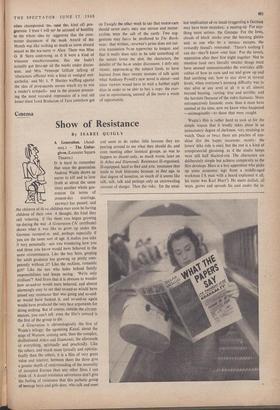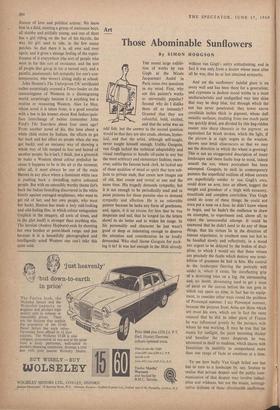Cinema
Show of Resistance
QUIGLY
By ISABEL A Generation. (Acad- emy.) – The Unfor- given. (Leicester Square Theatre.)
IT is hard to remember that since the generation Andrzej Wajda shows us learnt to kill and to love (both at about the same time) another whole gen- eration (in terms of present-day marriage, anyway) has passed; and
.the children of thine children may soon be having children of their own A thought, the kind they call 'sobering. if like them you began growing up.during the war. A Generation ('A' certificate) shows what it was like to grow up under the German occupati )n. and, perhaps especially if you are the same sort of age. it makes you take it very personally—sets you wondering how you and those you knJw would have behaved in the same circumstances. Like the boy hero, groping for adult guidance but growing up pretty com- petently without it? Like the reckless, romantic girl? Like the bov who hides behind family responsibilities and keeps saying: 'We're only civilians'? And from that it is obvious to wonder how so-and-so would have behaved, and almost alarmingly easy to see that so-and-so Would have joined any resistance that was going and so-and- so would have funked it, and so-and-so again would have produced the very best arguments for doing nothing. But of course, outside the circum- stances, you can't tell: even the film's coward is the first of the group to die.
A Generation is chronologically the first of Wajda's trilogy; the agonising Kama, about the seige of Warsaw, coming next, then the complex, disillusioned Ashes and Diamonds, the aftermath of everything, spiritually and practically. Like the others, and much more lyrically and optimis- tically than the others, it is a film of very great value and interest; between them the three give a greater depth of understanding of the mentality of occupied Europe than any other films I can think of. A dozen resistance adventures don't give the feeling of resistance that this pathetic group of teenage boys and girls does, who talk and meet and seem to do rather little because they are peering around to see what they should do, and even meeting other inimical groups, as was to happen so disastr-Jusly, so much worse, later on in Ashes and Diamonds. Resistance ill-organised, ill-equipped, hard to find and join, resistance that tends to look histrionic because, at that age, in that degree of isolation, so much of it seems like talk, talk, talk and perhaps only an unrewarding amount of danger. Then the risks: for the smal- lest implication of on insult (suggesting a German may have been mistaken; a beating-up. For any- thing more serious. the Gestapo For the Jews, clouds of black smoke over the burning ghetto and. to one who by a miracle escapes, the cowardly friend's reiterated: 'There's nothing I can do—they'll know your face For the lovers, separation after their first night together Not to mention (and very literally smaller things must have seemed unmentionable) the everyday diffi- culties of how to earn and eat and grow up and find anything out; how to stay alive at several levels. when everyone's pressing difficulty was to stay alive at any level at all It is all, almost beyond bearing. moving true and terrible; and the heroism (because of the risks) fantastic. More retrospectively fantastic even, than it must have seemed at the time, now we know what happened —unimaginably—to those that were caught.
Wajda's film is rather hard to took at for the simple reason that it mostly takes place in an unnecessary degree of darkness, very straining to watch. Once or twice there are patches of sun- shine (for the happy occasions mostly: the lovers' bike ride is one), but the rest is a kind of conspiratorial gloaming. as if the studio lamps were still half blacked-out. The characters are deliberately simple but achieve complexity as the film develops. Hero is a boy apprentice who picks up some economic tags from a middle-aged workman ('A man with a beard explained it all; his name was Karl Marx'). He starts dullish, all ways, grows and spreads his soul under the in- fluence of love and political ardour. We leave him in a field, meeting a group of resistance boys, all shabby and pitifully young; and one of them has a girl riding on the bar of his bicycle, the way his girl used to ride, in the few sunny patches. So that there it is, all over and over again, and it gives a strange feeling of the repeti- tiveness of it everywhere (the sort of people who went in for this sort of resistance, and the sort of people that goiag in for it turned out); and a .painful, passionately felt sympathy for one's con- temporaries, who weren't sitting dully at school.
John Huston's The Unforgiven (`A' certificate) rather surprisingly aroused a Times leader on the reassuringness of Westerns in a disintegrating world; surprisingly because it is anything but a routine or reassuring Western. Alan Le May, whose novel it is taken from, is a good novelist with a bee in his bonnet about Red Indian/pale- face interchange of babies (remember John Ford's The Searchers about four years ago? From another novel of his, this time about a white child stolen by Indians, the efforts to get her back and her effect on people when she was got back), and an uncanny way of showing a whole way of life steeped in fear and hatred of another people. So it isn't, I think, just a gimmick to make a Western about colour prejudice be- cause it happens to be in the air at the moment; after all, it must always be one of the main themes in any place where a dominant white race is pushing back a dwindling native coloured people. But with an ostensibly worthy theme (let's back the Indian foundling discovered in the white family against outraged neighbours. who want to get rid of her, and her own people, who want her back), Huston has made a very odd-looking and odd-feeling film, in which colour antagonism (implicit in the imagery, all sorts of times, and in the plot itself) is stronger than anything else. The heroine (Audrey Hepburn) ends by shooting her own brother at point-blank range, and just because it is a beautifully photographed and intelligently acted Western one can't take this quite cold.











































 Previous page
Previous page